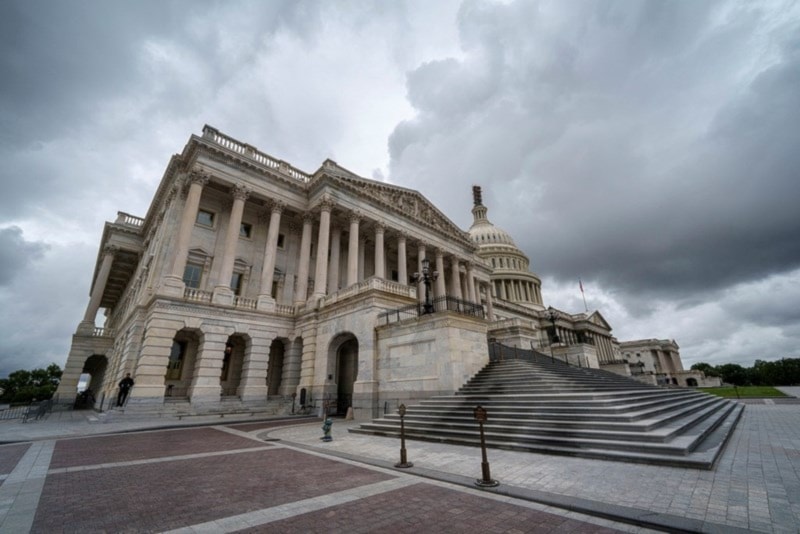US House approves 2024 defense bill despite surveillance concerns
This comes despite concerns from certain lawmakers about an extension of surveillance authority included in the legislation.
-

Storm clouds pass over the House of Representatives, foreground side of the US Capitol in Washington, Sunday, September 24, 2023. (AP)
The US House of Representatives approved the 2024 National Defense Authorization Act (NDAA), despite concerns raised by some lawmakers regarding a provision extending surveillance authority within the legislation.
The reconciled version of the NDAA received a vote of 310-118 in the House of Representatives, surpassing the two-thirds majority required for it to pass. The bill is now on its way to be finalized by US President Joe Biden.
The 2024 NDAA allocates $883.7 billion for national defense funding, reflecting a shift from the initially proposed $886 billion, as indicated by a spokesperson from the Senate Armed Services Committee.
The bill successfully passed through both the House and the Senate, although apprehensions were voiced in both chambers of Congress regarding an extension of surveillance powers under Section 702 of the Foreign Intelligence Surveillance Act (FISA) included in the legislation, with no corresponding reforms to the program.
“FISA Section 702 has allowed the FBI to spy on U.S. citizens more than 278,000 times without a warrant! FISA should not be combined with our national defense, and it is unacceptable that the DC Cartel is bypassing regular order to jam Members by forcing them to vote on two unrelated bills in one vote,” Congressman Matt Rosendale said on Thursday.
The big picture
Senator Rand Paul's efforts to eliminate the extension from the NDAA in the Senate were not successful.
The NDAA contains additional defense policy provisions, such as the extension of the Ukraine Security Assistance Initiative (USAI) until 2026. It allocates $300 million for USAI in both fiscal years 2024 and 2025 and establishes a Special Inspector General for Operation Atlantic Resolve, tasked with overseeing US assistance to Ukraine. The bill also prohibits the United States from withdrawing from NATO without the Senate's consent or approval through another congressional measure.
Furthermore, the legislation sanctions $14.7 billion for the Pacific Deterrence Initiative, extending the program through fiscal year 2024. It also greenlights the sale of nuclear-powered submarines to Australia. Additionally, the NDAA raises the salaries of US military service members and Defense Department civilians by 5.2% and introduces reforms to housing allowance policies.
'The greatest gift'
Just last week, Biden issued an urgent plea to US lawmakers, stressing the critical need for swift approval of funding to support Ukraine's war effort, otherwise, he underlined, Russia would win soon.
The US President warned that failure to act promptly would hand Russian President Vladimir Putin "the greatest gift" and could lead to more severe consequences for Ukraine.
"This cannot wait," Biden declared, emphasizing the urgency of the situation. "Congress needs to pass supplemental funding for Ukraine before they break for the holiday recess -- it's as simple as that."
The US President underscored the potential dangers of a successful Russian seizure of Ukraine, claiming that Putin's ambitions extend beyond its borders.
Biden has pledged to send an additional $200 million in aid to Ukraine, as discussed in a meeting with Ukrainian President Volodymyr Zelensky on Tuesday.
This comes after Congress Republicans blocked a bill to send military aid worth almost $60 billion to Kiev, as they are ever-more openly rejecting the need to fund Ukraine, saying Biden needs to devote more attention to domestic security, particularly to stopping illegal migration over the US-Mexican border.
Read next: US Senate fails to advance supplemental bill failing Ukraine, 'Israel'

 4 Min Read
4 Min Read








